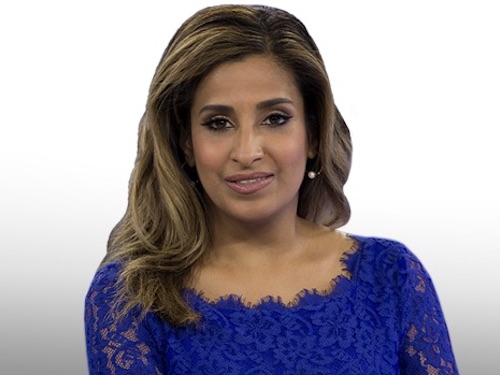Meet Anita Sharma

My name is Anita Sharma. I’m an anchor and reporter for Bell Media. Right now, my role entails doing business news. I also have a show called Market Call Tonight, where we handle news and information about the stock market and investing.
For CTV News Channel, I anchor their political news program. We do a lot of discussions about what’s happening in Ottawa, what’s happening in DC, and also lifestyle topics as well as.
What inspired you to be a journalist?
I love storytelling. I love learning about people, about ideas and subjects. I love analyzing situations. I was always drawn to why something’s happening. As a child, I used to drive my parents nuts because I asked so many questions. And who knew? I was a chatterbox in grade school. I looked at my report card and it always said ‘Anita talks too much.’ But what happened was, I didn’t realize I was setting myself up for a career, where all those characteristics that drove my parents and my teachers crazy, would help me with my career.
What are the biggest lessons you have learnt in your career?
I’ve learned I need to have a lot of patience. The bigger the world seems the world is actually very small. Treat people with respect. Everyone’s story matters, whether it’s the Prime Minister of Canada or the lady who owns the donut shop at the corner of your street. Everybody has a story to tell and listen more than you speak.
Toughest challenges and how did you overcome them?
After university, part of the criteria for being a well-rounded journalist, maybe it’s changed today, but in my day, we were encouraged to travel to different parts of the country to really understand what it’s like to be Canadian, in Manitoba, Canadian in Ontario, Canadian in New Brunswick.
I went to all these provinces, either for school or work, to basically get an understanding of the pulse of the people that I would be reporting for and reporting about. So one of the toughest challenges was being in my mid-20s and being away from home and just knowing that my end goal. It was hard for me, but my end goal was to make sure that I enriched my life with these experiences because it’s tough to get those experiences later in life. You can go back, but very rarely and not without difficulty. So, my 20s was the decade to basically just do a lot of learning and be a sponge and soak up different cultures and travel.
Do you often feel pressure? How do you cope or how do you address mental health challenges in journalism?
I like to tap into my resource, like my friendship network. There’s a few people that I can call thankfully, where I can let off steam. I’m in a very high pressured, minute to minute business like breaking news happens, you don’t have a lot of time to process events. Often on CTV News Channel, breaking news happens, you go to a right away. And sometimes you’re learning on the fly about the story. Like if it’s a fire in California or a train wreck in Quebec. You don’t have a lot of time to know the story in advance. There’s only so much preparation you can do.
So I would say that, for me, it’s been critical to be able to have some close confidence that I can call up and let off steam, talk about my day. Not everybody has a job like this and a lot of people have nine to five jobs that are more sedentary. It’s not better or worse, it’s just different when our jobs are more deadline oriented.
So working on deadlines can take its toll. So I need to be able to talk it out with people.
What advice do you have for those aspiring to go into the media industry?
My advice is, go to a small town and work your way up. Some have taken the shortcut and gone right to Toronto, but my advice would be [to] go to a smaller town. Make all your mistakes [and] learn as much as you can outside the big cities so that when the big city comes calling if, in fact, that’s your goal, you’re gonna be ready to go.
But I’ll also say for a lot of my colleagues when they took that advice, actually stayed in a smaller town. They like being in a local news setting. They liked the vibe. They liked the news stories, liked the lifestyle, so everyone’s different. And you as a journalist will know what you will naturally gravitate towards what you like, whether it’s recording, whether it’s producing, whether it’s directing, whether it’s anchoring.
So my advice to you all would just be [to] consume as much information as you possibly can. Keep asking questions, get out there, get all the experience, even if you don’t think the experience is relevant.
Interview conducted by JSOC second year representative, Jasdeep Kaur.